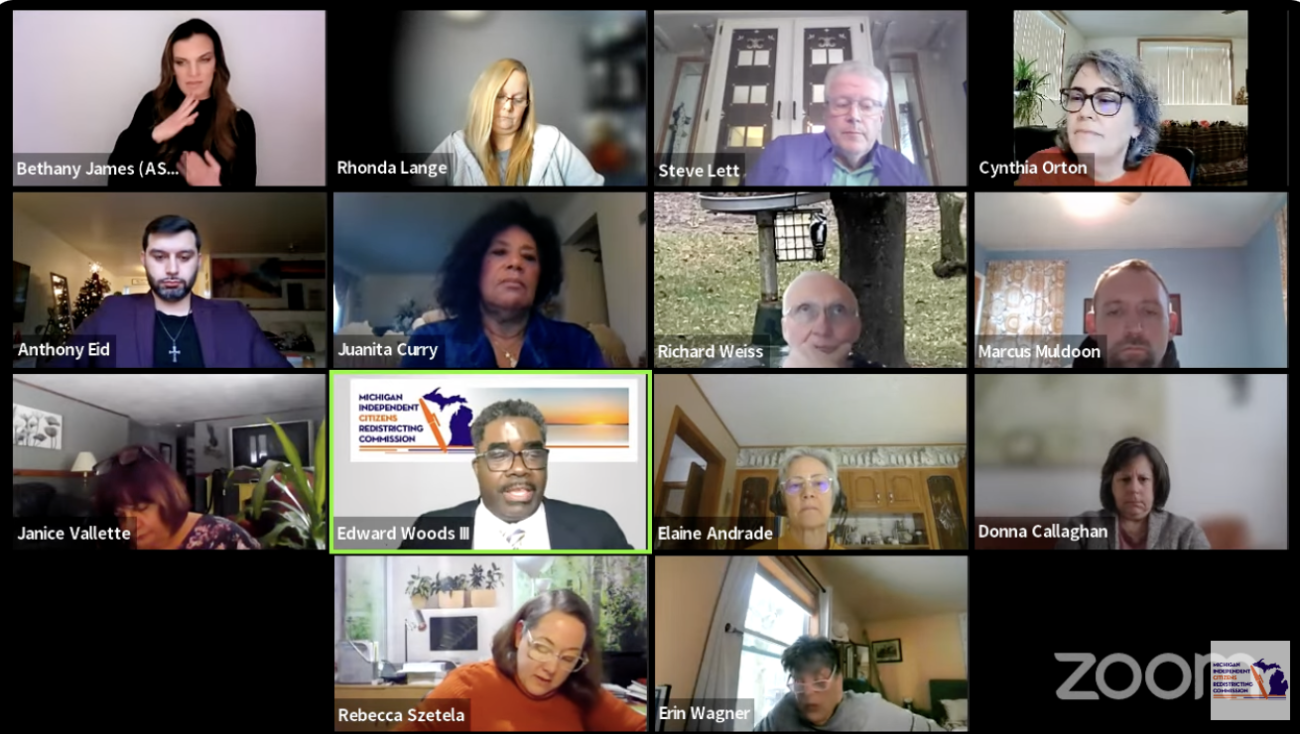Federal judges set aggressive timeline to redraw state House district maps

- Court sets March 29 deadline for new Detroit state House maps, redistricting commission must have drafts by Feb. 2
- Two outside court-appointed experts were named to draw alternate maps and review the commission’s work
- Commission director says the group will need millions more from Legislature to pay for court costs
Michigan's redistricting commission will have a dozen marathon mapping sessions this month to meet a court-ordered deadline that calls for new Detroit-area state House maps by March 29.
Under an aggressive schedule released Thursday by the three-judge federal panel that struck down 13 metro-Detroit state districts in December as unconstitutional, the Michigan Independent Citizens Redistricting Commission will need to post a new state House draft map for public comment by Feb. 2. That allows roughly two months to then finalize the boundaries.
A timeline to redraw six Senate districts will come later, with a hearing set for April 12. The judges determined that a request by Detroit voters who sued the commission to hold special elections in those districts in 2024 wouldn't be possible.
Related:
- Can Michigan redistricting panel play nice, draw legal maps? It may get messy
- Detroit legislative districts could be redrawn by spring, court suggests
- Michigan redistricting panel votes to appeal court ruling invalidating Detroit districts
On the House maps, the public comment period will end Feb. 23 and the commission’s final product is due in court by March 1, the judges said. Following review by plaintiffs and court-appointed experts, the court will approve a new slate of metro Detroit House districts by March 29.
While the commission is working, a court-appointed expert — political science professor Michael Barber of Brigham Young University — will come up with an alternate version in the event the commission’s House plan doesn’t meet court expectations.
A separate court-appointed expert — political science professor Bernard Grofman of the University of California-Irvine — will be assigned to review the commission's work and report back to the court as to whether it meets constitutional requirements.
Affected districts
A three-judge panel in December deemed the following state political districts unconstitutional and ordered them redrawn. Reconfiguring the districts could affect adjoining ones as well, causing other changes. Here are the ones at issue:
- House District 1, represented by Rep. Tyrone Carter, D-Detroit
- House District 7, represented by Rep. Helena Scott, D-Detroit
- House District 8, represented by Rep. Mike McFall, D-Hazel Park
- House District 10, represented by House Speaker Joe Tate, D-Detroit
- House District 11, represented by Rep. Veronica Paiz, D-Harper Woods
- House District 12, represented by Rep. Kimberly Edwards, D-Eastpointe
- House District 14, represented by Rep. Donavan McKinney, D-Detroit
- Senate District 1, represented by Sen. Erika Geiss, D-Taylor
- Senate District 3, represented by Sen. Stephanie Chang, D-Detroit
- Senate District 6, represented by Sen. Mary Cavanagh, D-Redford Township
- Senate District 8, represented by Sen. Mallory McMorrow, D-Royal Oak
- Senate District 10, represented by Sen. Paul Wojno, D-Warren
- Senate District 11, represented by Sen. Veronica Klinefelt, D-Eastpointe
Costs for both experts will be paid for by the commission, a taxpayer-funded entity. It wasn’t clear how much money that would be, save for covering “all reasonable costs and expenses.”
On Thursday, commissioners met for hours to agree to a mapping schedule and debate a slew of procedural issues, including seeking more money from the state Legislature and debating, but ultimately rejecting, a proposal to increase their individual salaries.
The commissioners agreed to meet over 12 days between Jan. 16 and Feb. 1 in a mix of virtual meetings and in-person sessions in Detroit to work through the mapping process.
In a final effort to defend the current maps, commissioners filed an appeal of the federal panel’s December decision with the U.S. Supreme Court, which was acknowledged by justices Thursday. Plaintiffs challenging the maps were asked to submit a response to the high court by Jan. 17.
Barring Supreme Court intervention, mapmakers are on the hook for delivering new political district lines after a group of metro Detroiters successfully challenged the current maps on grounds that commissioners improperly used racial data to dilute the power of Black voters.
Citing time constraints in getting the House maps redrawn ahead of the November 2024 elections, the federal three-judge panel denied the commission’s request to pause its ruling during the appeals process.
The plaintiffs initially sought 2024 changes to state Senate maps as well, proposing special elections in at least six state Senate districts two years into the current four-year term. Judges ultimately agreed with Secretary of State Jocelyn Benson and the Michigan Senate, finding that option would leave some voters being represented by a lawmaker they didn’t elect.
Commissioners will be working with the same firm they used during the original mapping process, Election Data Services, to work through the technical details of redrawing the lines.
Commissioners and their mapping experts indicated Thursday they'll be limiting their work as much as possible to impacted districts and exclude racial data from the software in an attempt to comply with court orders.
The additional work will come at a cost, Edward Woods, the commission’s executive director, told members. He indicated the group would need an estimated $3.3 million in taxpayer dollars to cover court costs and fees for in-person mapping sessions.
Members debated, but ultimately declined, to give themselves a raise in anticipation of the additional work. The effort, backed primarily by Democratic commissioner Juanita Curry, was voted down 7-5 with one abstention.
Commissioner Rebecca Szetela, in advocating against a pay raise, pointed out that commissioners met for 16 hours and 47 minutes in 2023 and collected a salary of roughly $40,000, meaning members made about $2,342.65 per hour.
Steven Lett, a fellow independent on the panel, agreed, telling commissioners: “We need to step up and do the maps. We don’t need to poke the bear at this time.”
Since the current maps went into effect two years ago, the commission has on occasion clashed with lawmakers when seeking additional funds. Rep. Ann Bollin, R-Brighton Township, recently told Bridge Michigan the commission’s budget “should not be a free-for-all” that taxpayers foot the bill for.
On Tuesday, Gov. Gretchen Whitmer told reporters the administration is closely following redistricting developments, expressing concern about the unknowns but defending the citizen-led process over the previous practice, in which the political party in charge in Lansing drew the lines.
“There's been a lot of reasons to have confidence that it's been an improvement on the Legislature drawing seats that helped them, as opposed to the people drawing seats that ensure that they are well represented,” she said.
See what new members are saying about why they donated to Bridge Michigan:
- “In order for this information to be accurate and unbiased it must be underwritten by its readers, not by special interests.” - Larry S.
- “Not many other media sources report on the topics Bridge does.” - Susan B.
- “Your journalism is outstanding and rare these days.” - Mark S.
If you want to ensure the future of nonpartisan, nonprofit Michigan journalism, please become a member today. You, too, will be asked why you donated and maybe we'll feature your quote next time!




